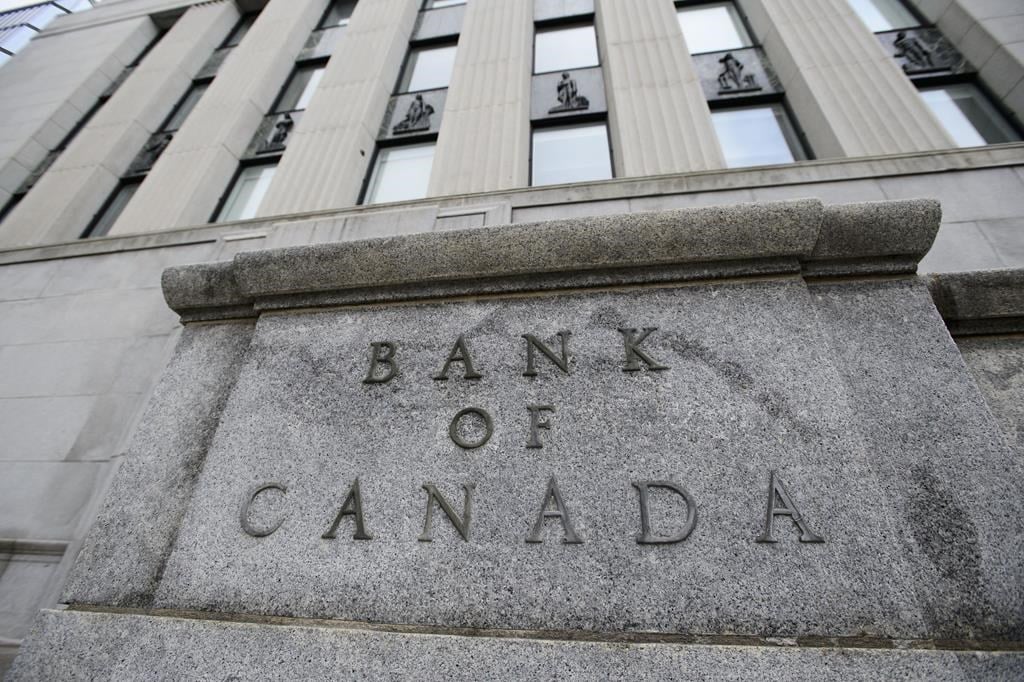
The man at the helm of Canada’s central bank says the Bank of Canada plans to be clearer in the coming years when it lets the cost of living rise for the good of the economy.
Governor Tiff Macklem said Wednesday the issue comes down to the trust Canadians have in the Bank of Canada to make sure the pace of price increases don’t run too high.
The Bank of Canada and federal government agreed this week to keep the central bank’s inflation target range of one to three per cent, but the bank will also now more formally keep tabs on the labour market when making interest rate decisions.
In a virtual speech to Empire Club of Canada, Macklem said that may mean the bank may sometimes let inflation run at the higher end of its target range if it helps bolster the job market.
But he also noted that high inflation is difficult for many Canadians because as the cost of living goes up, households have trouble stretching to pay their bills.
Statistics Canada reported earlier Wednesday that the annual pace of inflation held steady in November at an 18-year high as the consumer price index rose 4.7 per cent compared with a year ago.
Over that same stretch, however, wages only went up by 2.8 per cent, meaning that consumers, on average, saw a drop in their purchasing power.
Wages usually lag behind inflation, but with the tight labour market causing wages to already increase substantially for job hoppers, the amount paid to workers could soon catch up to the pace of price gains, said Tu Nguyen, an economist with accounting firm RSM Canada.
A key driver of inflation in November was once again the price of gasoline, which rose 43.6 per cent compared with the same month a year earlier, slightly above the October year-over-year rise of 41.7 per cent.
The annual rate of inflation in November would have been 3.6 per cent if gasoline prices had been excluded, the same as in October.
Also fuelling gains in the consumer price index last month were increases in furniture and food prices.
Supply chain disruptions and low crop yields helped push food prices up 4.7 per cent in November compared with the same month a year ago for the largest increase since January 2015 when prices went up by 5.4 per cent.
November marked eight straight months that headline Inflation has come in above the Bank of Canada’s target range of between one and three per cent, which has not been seen since a similar run ended in December 1991.
Stephen Tapp, chief economist with the Canadian Chamber of Commerce, said high inflation isn’t just hitting consumers hard, but is also driving up costs for businesses as the economy struggles with labour shortages, supply chain disruptions, and renewed uncertainty due to the latest rise in COVID cases.
“In the near-term, profitability will be squeezed, and if businesses pass cost increases onto their consumers it’ll prolong pressures,” he said.
The average of the three measures for core inflation, which are considered better gauges of underlying price pressures and closely tracked by the Bank of Canada, was 2.73 per cent for November, up slightly from October, Statistics Canada said. The average was last that high in November 2008.
Stephen Brown, senior Canada economist with Capital Economics, said the rise in the measures suggest inflationary pressures are broadening.
The Bank of Canada has said it doesn’t foresee a first hike to its trend-setting interest rate until at least April. The rate has been at 0.25 per cent since the pandemic upended the Canadian economy almost two years ago.
Since then, employment has rebounded and the economy has nearly shook off of the shook off the shock of COVID-19.
Statistics Canada also said Wednesday that the November inflation reading was the first without special consideration for certain goods and services that were unavailable because of the pandemic. The agency also noted that the data is largely unaffected by November flooding in British Columbia because the majority of prices were collected before it occurred.
This report by The Canadian Press was first published Dec. 15, 2021.




